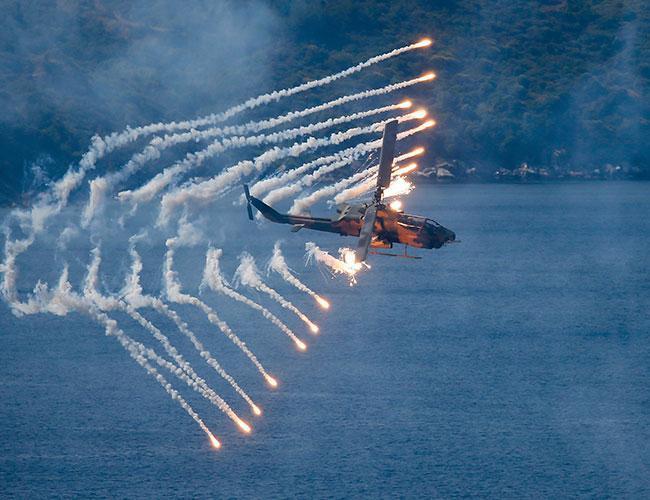Locally made drones contributed greatly to success of Afrin op: Top commander
İZMİR

Locally made drones played an important role in carrying out Turkey’s “Operation Olive Branch” with minimal harm to civilians, Chief of General Staff Hulusi Akar stated on May 10.
“Local weaponry systems, particularly unmanned aerial vehicles, were used effectively during this operation,” Akar told reporters on the sidelines of the EFES 2018 Combined Joint Military Exercise in the western province of İzmir.
The Turkish army launched “Operation Olive Branch” on Jan. 20 along with elements of the Free Syrian Army (FSA) to clear Syrian Kurdish People’s Protection Units (YPG) militants from the northwestern Syrian district of Afrin.
Indigenous weapons
Turkey has in recent years accelerated efforts to develop its own weapons systems. The Turkish Aerospace Industries (TAI) produces ANKA unmanned aerial vehicles and ATAK helicopters for the Turkish army.
The upgraded “kamikaze” drones - ALPAGU Blok 2 and KARGU - developed by Turkish defense contractor STM, were exhibited for the first time at the Eurasia Airshow in the Mediterranean province of Antalya in April.
Turkey is also preparing to produce its own tanks, with production of the battle tank “Altay” due to be completed in 18 months, İsmail Demir, undersecretary for the defense industry of Turkey, announced in April.
President Recep Tayyip Erdoğan said in February that Turkey was targeting the production of unmanned tanks for its armed forces.
“We will carry it a step further after domestically produced unmanned aerial vehicles. We should reach the ability to produce unmanned tanks as well. We will do it,” Erdoğan said.
In February, Turkish defense companies successfully test-fired its domestically produced HİSAR-A missile, developed to protect military bases, ports, facilities and troops against air-based threats.
Fight against FETÖ
“The military has grown stronger as the army is cleaned from members of FETÖ,” Akar also said on May 10, referring to the network of U.S.-based Islamic preacher Fethullah Gülen. The authorities now refer to the network as the Fethullahist Terrorist Organization (FETÖ), which is widely believed to have orchestrated the July 2016 coup attempt, which left 250 people dead and nearly 2,200 injured.
“Those traitorous FETÖ members tried to undermine the Turkish military, targeting the republic and our democracy. But our heroic military and our citizens stood against FETÖ in unity and defeated it,” he added.
Since the coup attempt, the Turkish authorities have apprehended thousands of people, including military personnel, on terror charges.
Akar was among the 65 observers and representatives from 38 countries attending the “Distinguished Observer Day” in the daytime session on the fourth day of the EFES 2018 Combined Joint Military Exercise.
Among the observers of the live-fire military drill were Azerbaijan’s Defense Minister Col. Gen. Zakir Hasanov, the army chiefs of Georgia, Kazakhstan, Sudan, Bosnia and Herzegovina, Kuwait, Nigeria, Uzbekistan, Qatar and Romania, and Islamic Military Counter Terrorism Coalition Commander Gen. Raheel Sharif.
Around 7,500 military personnel are on duty during the exercise, while 945 are from allied nations including the U.S., Azerbaijan, Bahrain, Bangladesh, the U.K., Bosnia and Herzegovina, Algeria, Georgia, Italy, Qatar, Kazakhstan, Kosovo, Kuwait, Hungary, Macedonia, Malaysia, Mongolia, Uzbekistan, Pakistan, Romania, Slovakia, Saudi Arabia and Jordan.
The exercise in İzmir’s Seferihisar district started on May 7 and will continue until May 11.
















